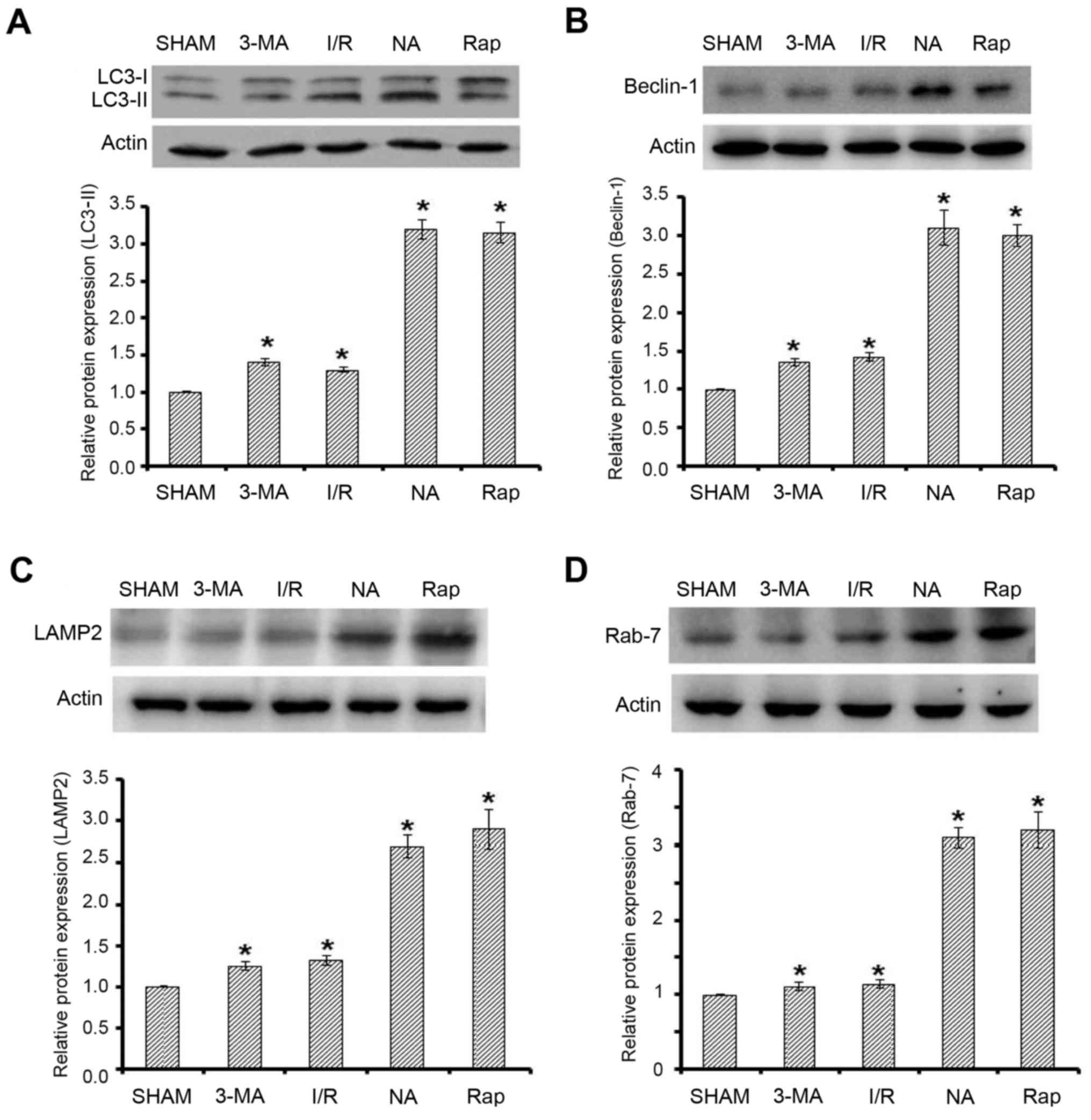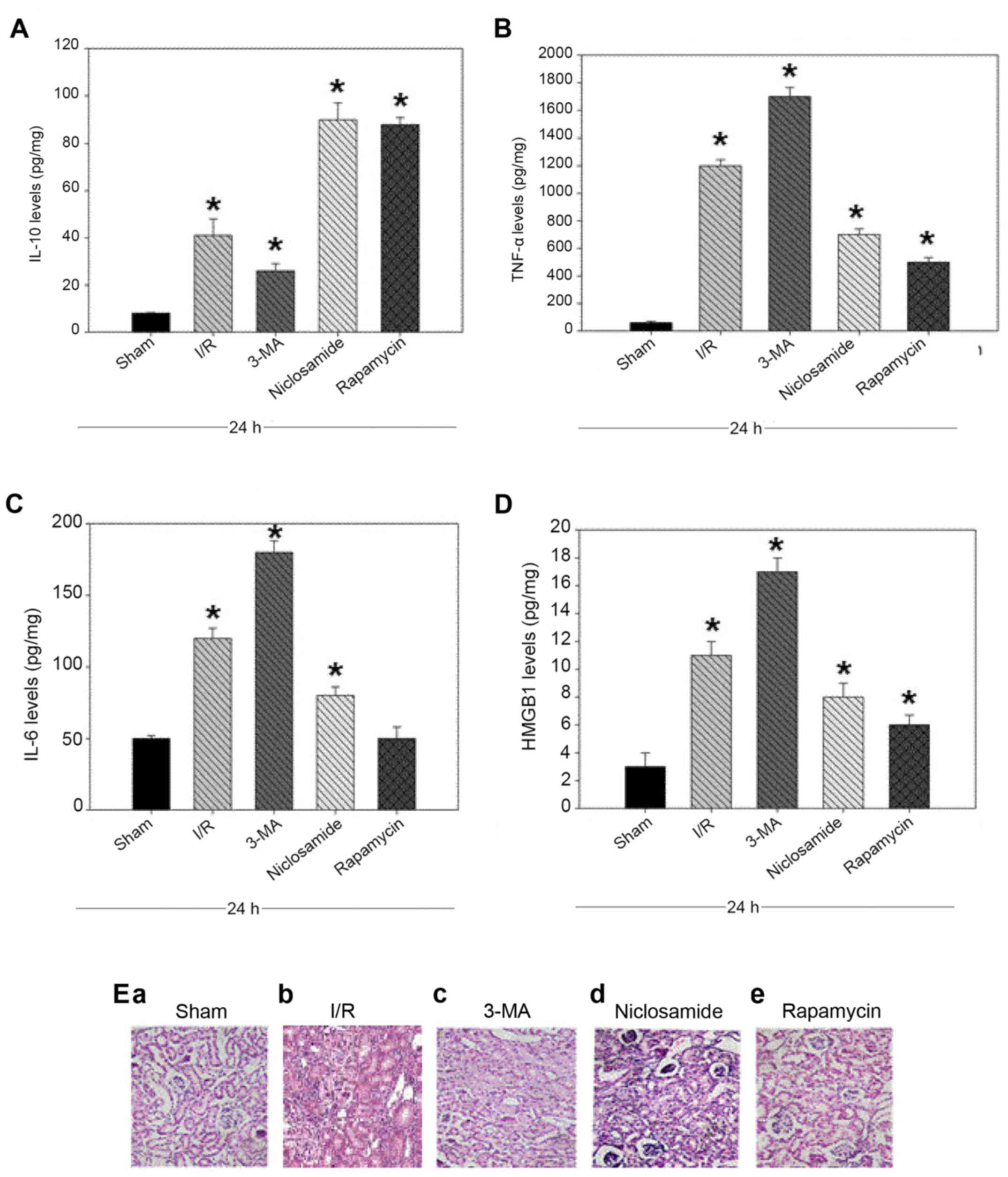|
1
|
Kunzendorf U, Haase M, Rolver L and
Haase-Fielitz A: Novel aspects of pharmacological therapies for
acute renal failure. Drugs. 70:1099–1114. 2010. View Article : Google Scholar : PubMed/NCBI
|
|
2
|
Mangano CM, Diamondstone LS, Ramsay JG,
Aggarwal A, Herskowitz A and Mangano DT: Renal dysfunction after
myocardial revascularization: Risk factors, adverse outcomes and
hospital resource utilization. The Multicenter Study of
Perioperative Ischemia Research Group. Ann Intern Med. 128:194–203.
1998. View Article : Google Scholar : PubMed/NCBI
|
|
3
|
Malek M and Nematbakhsh M: Renal
ischemia/reperfusion injury; from pathophysiology to treatment. J
Renal Inj Prev. 4:20–27. 2015.PubMed/NCBI
|
|
4
|
Aydin Z, van Zonneveld AJ, de Fijter JW
and Rabelink TJ: New horizons in prevention and treatment of
ischaemic injury to kidney transplants. Nephrol Dial Transplant.
22:342–346. 2007. View Article : Google Scholar : PubMed/NCBI
|
|
5
|
Chertow GM, Burdick E, Honour M, Bonventre
JV and Bates DW: Acute kidney injury, mortality, length of stay,
and costs in hospitalized patients. J Am Soc Nephrol. 16:3365–3370.
2005. View Article : Google Scholar : PubMed/NCBI
|
|
6
|
Kazmers A, Jacobs L and Perkins A: The
impact of complications after vascular surgery in veterans affairs
medical centers. J Surg Res. 67:62–66. 1997. View Article : Google Scholar : PubMed/NCBI
|
|
7
|
Levy EM, Viscoli CM and Horwitz RI: The
effect of acute renal failure on mortality. A cohort analysis.
JAMA. 275:1489–1494. 1996. View Article : Google Scholar : PubMed/NCBI
|
|
8
|
Zhang J, Li JH, Wang L, Han M, Xiao F, Lan
XQ, Li YQ, Xu G and Yao Y: Glucocorticoid receptor agonist
dexamethasone attenuates renal ischemia/reperfusion injury by
up-regulating eNOS/iNOS. J Huazhong Univ Sci Technolog Med Sci.
34:516–520. 2014. View Article : Google Scholar : PubMed/NCBI
|
|
9
|
Bonventre JV: Daily hemodialysis-will
treatment each day improve the outcome in patients with acute renal
failure? N Engl J Med. 346:362–364. 2002. View Article : Google Scholar : PubMed/NCBI
|
|
10
|
Eltzschig HK and Eckle T: Ischemia and
reperfusion-from mechanism to translation. Nat Med. 17:1391–1401.
2011. View
Article : Google Scholar : PubMed/NCBI
|
|
11
|
Gabay C and Kushner I: Acute-phase
proteins and other systemic responses to inflammation. N Engl J
Med. 340:448–454. 1999. View Article : Google Scholar : PubMed/NCBI
|
|
12
|
McCaughan JA, Patterson CC, Maxwell AP and
Courtney AE: Factors influencing survival after kidney transplant
failure. Transplant Res. 3:182014. View Article : Google Scholar : PubMed/NCBI
|
|
13
|
Grams ME and Rabb H: The distant organ
effects of acute kidney injury. Kidney Int. 81:942–948. 2012.
View Article : Google Scholar : PubMed/NCBI
|
|
14
|
Hotta O, Yusa N, Ooyama M, Unno K, Furuta
T and Taguma Y: Detection of urinary macrophages expressing the
CD16 (Fc gamma RIII) molecule: A novel marker of acute inflammatory
glomerular injury. Kidney Int. 55:1927–1934. 1999. View Article : Google Scholar : PubMed/NCBI
|
|
15
|
Akcay A, Nguyen Q and Edelstein CL:
Mediators of inflammation in acute kidney injury. Mediators
Inflamm. 2009:1370722009. View Article : Google Scholar : PubMed/NCBI
|
|
16
|
Lee DW, Faubel S and Edelstein CL:
Cytokines in acute kidney injury (AKI). Clin Nephrol. 76:165–173.
2011. View
Article : Google Scholar : PubMed/NCBI
|
|
17
|
Molitoris BA and Sutton TA: Endothelial
injury and dysfunction: Role in the extension phase of acute renal
failure. Kidney Int. 66:496–499. 2004. View Article : Google Scholar : PubMed/NCBI
|
|
18
|
Umehara H, Goda S, Imai T, Nagano Y,
Minami Y, Tanaka Y, Okazaki T, Bloom ET and Domae N: Fractalkine, a
CX3C-chemokine, functions predominantly as an adhesion molecule in
monocytic cell line THP-1. Immunol Cell Biol. 79:298–302. 2001.
View Article : Google Scholar : PubMed/NCBI
|
|
19
|
Gottlieb RA and Mentzer RM: Autophagy
during cardiac stress: Joys and frustrations of autophagy. Annu Rev
Physiol. 72:45–59. 2010. View Article : Google Scholar : PubMed/NCBI
|
|
20
|
Glick D, Barth S and Macleod KF:
Autophagy: Cellular and molecular mechanisms. J Pathol. 221:3–12.
2010. View Article : Google Scholar : PubMed/NCBI
|
|
21
|
Yorimitsu T and Klionsky DJ: Autophagy:
Molecular machinery for self-eating. Cell Death Differ. 12 Suppl
2:S1542–S1552. 2005. View Article : Google Scholar
|
|
22
|
Chien CT, Shyue SK and Lai MK: Bcl-xL
augmentation potentially reduces ischemia/reperfusion induced
proximal and distal tubular apoptosis and autophagy.
Transplantation. 84:1183–1190. 2007. View Article : Google Scholar : PubMed/NCBI
|
|
23
|
Wu HH, Hsiao TY, Chien CT and Lai MK:
Ischemic conditioning by short periods of reperfusion attenuates
renal ischemia/reperfusion induced apoptosis and autophagy in the
rat. J Biomed Sci. 16:192009. View Article : Google Scholar : PubMed/NCBI
|
|
24
|
Suzuki C, Isaka Y, Takabatake Y, Tanaka H,
Koike M, Shibata M, Uchiyama Y, Takahara S and Imai E:
Participation of autophagy in renal ischemia/reperfusion injury.
Biochem Biophys Res Commun. 368:100–106. 2008. View Article : Google Scholar : PubMed/NCBI
|
|
25
|
Jiang M, Liu K, Luo J and Dong Z:
Autophagy is a renoprotective mechanism during in vitro hypoxia and
in vivo ischemia-reperfusion injury. Am J Pathol. 176:1181–1192.
2010. View Article : Google Scholar : PubMed/NCBI
|
|
26
|
Lo S, Yuan SS, Hsu C, Cheng YJ, Chang YF,
Hsueh HW, Lee PH and Hsieh YC: Lc3 over-expression improves
survival and attenuates lung injury through increasing
autophagosomal clearance in septic mice. Ann Surg. 257:352–363.
2013. View Article : Google Scholar : PubMed/NCBI
|
|
27
|
Hsieh CH, Pai PY, Hsueh HW, Yuan SS and
Hsieh YC: Complete induction of autophagy is essential for
cardioprotection in sepsis. Ann Surg. 253:1190–1200. 2011.
View Article : Google Scholar : PubMed/NCBI
|
|
28
|
Takahashi W, Watanabe E, Fujimura L,
Watanabe-Takano H, Yoshidome H, Swanson PE, Tokuhisa T, Oda S and
Hatano M: Kinetics and protective role of autophagy in a mouse
cecal ligation and puncture-induced sepsis. Crit Care. 17:R1602013.
View Article : Google Scholar : PubMed/NCBI
|
|
29
|
Wu CT, Sheu ML, Tsai KS, Chiang CK and Liu
SH: Salubrinal, an eIF2a dephosphorylation inhibitor, enhances
cisplatin-induced oxidative stress and nephrotoxicity in a mouse
model. Free Radic Biol Med. 51:671–680. 2011. View Article : Google Scholar : PubMed/NCBI
|
|
30
|
NRC [National Research Council]: Guide for
the Care and Use of Laboratory Animals. 7th. Washington DC:
National Academy Press; 1996
|
|
31
|
Wei Q and Dong Z: Mouse model of ischemic
acute kidney injury: Technical notes and tricks. Am J Physiol Renal
Physiol. 303:F1487–F1494. 2012. View Article : Google Scholar : PubMed/NCBI
|
|
32
|
Khalid U, Pino-Chavez G, Nesargikar P,
Jenkins RH, Bowen T, Fraser DJ and Chavez R: Kidney ischaemia
reperfusion injury in the rat: The EGTI scoring system as a valid
and reliable tool for histological assessment. J Histol
Histopathol. 3:12016. View Article : Google Scholar
|
|
33
|
Bellomo R, Kellum JA and Ronco C: Acute
kidney injury. Lancet. 380:756–766. 2012. View Article : Google Scholar : PubMed/NCBI
|
|
34
|
Wang X, Du Z, Li L, Shi M and Yu Y: Beclin
1 and p62 expression in non-small cell lung cancer: Relation with
malignant behaviors and clinical outcome. Int J Clin Exp Pathol.
8:10644–10652. 2015.PubMed/NCBI
|
|
35
|
Huber TB, Edelstein CL, Hartleben B, Inoki
K, Jiang M, Koya D, Kume S, Lieberthal W, Pallet N, Quiroga A, et
al: Emerging role of autophagy in kidney function, diseases and
aging. Autophagy. 8:1009–1031. 2012. View Article : Google Scholar : PubMed/NCBI
|
|
36
|
Basile DP, Friedrich JL, Spahic J, Knipe
N, Mang H, Leonard EC, Changizi-Ashtiyani S, Bacallao RL, Molitoris
BA and Sutton TA: Impaired endothelial proliferation and
mesenchymal transition contribute to vascular rarefaction following
acute kidney injury. Am J Physiol Renal Physiol. 300:F721–F733.
2011. View Article : Google Scholar : PubMed/NCBI
|
|
37
|
Linkermann A, Bräsen JH, Himmerkus N, Liu
S, Huber TB, Kunzendorf U and Krautwald S: Rip1
(receptor-interacting protein kinase 1) mediates necroptosis and
contributes to renal ischemia/reperfusion injury. Kidney Int.
81:751–761. 2012. View Article : Google Scholar : PubMed/NCBI
|
|
38
|
Maiuri MC, Zalckvar E, Kimchi A and
Kroemer G: Self-eating and self-killing: Crosstalk between
autophagy and apoptosis. Nat Rev Mol Cell Biol. 8:741–752. 2007.
View Article : Google Scholar : PubMed/NCBI
|
|
39
|
Livingston MJ and Dong Z: Autophagy in
acute kidney injurySeminars in nephrology. 34. WB Saunders; pp.
17–26. 2014, View Article : Google Scholar : PubMed/NCBI
|
|
40
|
Hsieh YC, Athar M and Chaudry IH: When
apoptosis meets autophagy: Deciding cell fate after trauma and
sepsis. Trends Mol Med. 15:129–138. 2009. View Article : Google Scholar : PubMed/NCBI
|
|
41
|
Mizushima N: Autophagy: Process and
function. Genes Dev. 21:2861–2873. 2007. View Article : Google Scholar : PubMed/NCBI
|
|
42
|
Zhong Y, Wang QJ, Li X, Yan Y, Backer JM,
Chait BT, Heintz N and Yue Z: Distinct regulation of autophagic
activity by Atg14L and Rubicon associated with Beclin
1-phosphatidylinositol-3-kinase complex. Nat Cell Biol. 11:468–476.
2009. View
Article : Google Scholar : PubMed/NCBI
|
|
43
|
Saftig P and Eskelinen EL: Live longer
with LAMP-2. Nat Med. 14:909–910. 2008. View Article : Google Scholar : PubMed/NCBI
|
|
44
|
Zhang YL, Cao YJ, Zhang X, Liu HH, Tong T,
Xiao GD, Yang YP and Liu CF: The autophagy-lysosome pathway: A
novel mechanism involved in the processing of oxidized LDL in human
vascular endothelial cells. Biochem Biophys Res Commun.
394:377–382. 2010. View Article : Google Scholar : PubMed/NCBI
|
|
45
|
Gutierrez MG, Munafó DB, Berón W and
Colombo MI: Rab7 is required for the normal progression of the
autophagic pathway in mammalian cells. J Cell Sci. 117:2687–2697.
2004. View Article : Google Scholar : PubMed/NCBI
|
|
46
|
Land WG: The role of postischemic
reperfusion injury and other nonantigen-dependent inflammatory
pathways in transplantation. Transplantation. 79:505–514. 2005.
View Article : Google Scholar : PubMed/NCBI
|
|
47
|
Serteser M, Koken T, Kahraman A, Yilmaz K,
Akbulut G and Dilek ON: Changes in hepatic TNF-alpha levels,
antioxidant status and oxidation products after renal
ischemia/reperfusion injury in mice. J Surg Res. 107:234–240. 2002.
View Article : Google Scholar : PubMed/NCBI
|
|
48
|
Ysebaert DK, de Greef KE, Vercauteren SR,
Ghielli M, Verpooten GA, Eyskens EJ and De Broe ME: Identification
and kinetics of leukocytes after severe ischaemia/reperfusion renal
injury. Nephrol Dial Transplant. 15:1562–1574. 2000. View Article : Google Scholar : PubMed/NCBI
|
|
49
|
Bolisetty S and Agarwal A: Neutrophils in
acute kidney injury: Not neutral any more. Kidney Int. 75:674–676.
2009. View Article : Google Scholar : PubMed/NCBI
|
|
50
|
Jing XX, Wang ZG, Ran HT, Li L, Wu X, Li
XD, Peng XQ, Yang CJ, Li XS and Zhang QX: Evaluation of renal
ischemia-reperfusion injury in rabbits using microbubbles targeted
to activated neutrophils. Clin Imaging. 32:178–182. 2008.
View Article : Google Scholar : PubMed/NCBI
|
|
51
|
Dessing MC, Pulskens WP, Teske GJ, Butter
LM, van der Poll T, Yang H, Tracey KJ, Nawroth PP, Bierhaus A,
Florquin S and Leemans JC: RAGE does not contribute to renal injury
and damage upon ischemia/reperfusion-induced injury. J Innate
Immun. 4:80–85. 2012. View Article : Google Scholar : PubMed/NCBI
|



















